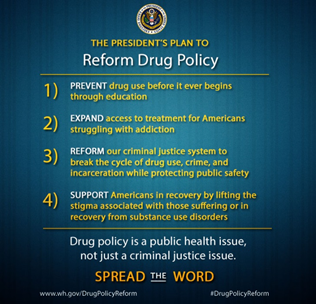 Recovery Becomes a National Policy Priority
Recovery Becomes a National Policy PriorityIn April, the Obama Administration released
a science-based drug policy that addresses the national drug challenge as a public health issue, not just a criminal justice issue. The 2013 National Drug Control Strategy is built upon the latest scientific research demonstrating that addiction is a chronic disease of the brain that can be successfully prevented, treated, and recovered from.
As a result, the Strategy directs Federal agencies to expand community-based efforts to prevent drug use before it begins, empower healthcare workers to intervene early at the first signs of a substance use disorder, expand access to treatment for those who need it, and support the millions of Americans in recovery.
Since 2010, the Strategy has focused Federal efforts in the recovery domain on three broad areas:
To ensure that there was progress in these areas, the Obama Administration established the first-ever Recovery Branch within the ONDCP Office of Demand Reduction.
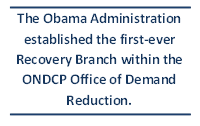
ONDCP is going to new lengths to raise awareness and reduce the stigma around addiction and recovery and to elevate the voice of the recovery community. This is central if we are to unravel policies, practices, and perceptions that have emerged from decades of stigma, fear, and misunderstanding; it is, therefore, one of the cornerstones of ONDCP efforts in the recovery domain and a key element of the overall drug policy reform agenda.
In June of 2012, ONDCP Director Kerlikowske delivered a major address outlining Administration goals, accomplishments, and priorities in the recovery domain from the Betty Ford Center. One of its key messages is that drug addiction is not a moral failing on the part of the individual, but a chronic disease of the brain that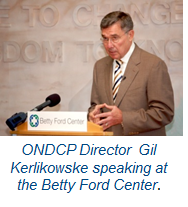 can be treated and from which one can recover. This message underpins all of ONDCP’s messaging and outreach on recovery.
can be treated and from which one can recover. This message underpins all of ONDCP’s messaging and outreach on recovery.
One of the most significant steps ONDCP has taken recently was the creation of the Americans in Recovery Facebook Page. Its purpose is to provide a platform for the recovery community, notify it of ONDCP and recovery news. Please take a look at the page, like it, and share it with others who might be interested in it. In an effort to get word out, ONDCP is sponsoring a Facebook profile picture campaign for Recovery Month 2013. Our goal is to get as many people as possible to switch their profile picture to the one we will be using for the site during the month of September.
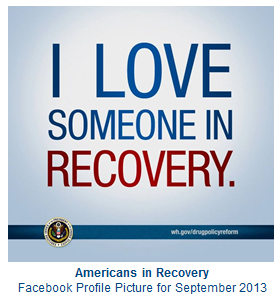
Young people are one of the driving forces of the recovery community today. And social media are a key mechanism for reaching them. We have featured young people on the Americans in Recovery Facebook page and have conducted Twitter chats, including one by Young People in Recovery Executive Director, Devin Fox. In the future, ONDCP will also be conducting Facebook chats with well-known members of the recovery community. Additionally, ONDCP has highlighted the work of leaders in the recovery community through national awards. In 2012, Recovery Alliance of El Paso Director Ben Bass was honored at the White House as a Champion of Change and, in 2013 Devin Fox was honored as an Advocate for Action.
Furthering these efforts is the fact that ONDCP’s recently appointed Deputy Director, Michael Botticelli, is open about being in long-term recovery. The former Massachusetts Single State Authority (SSA), Michael was the inaugural winner of the Ramstad-Kennedy Award which honors an SSA Director who has demonstrated outstanding leadership in support of recovery and Recovery Month. Additionally, Recovery Branch Chief Peter Gaumond is also openly in long-term recovery.
Another step taken by the Obama Administration was the creation of the ONDCP Quarterly Recovery Update, which provides information on what ONDCP is doing in the recovery domain, highlights recovery-related research, innovative approaches to recovery support services, and recovery-related events. Each issue also celebrates a Voice of Recovery, an individual in recovery 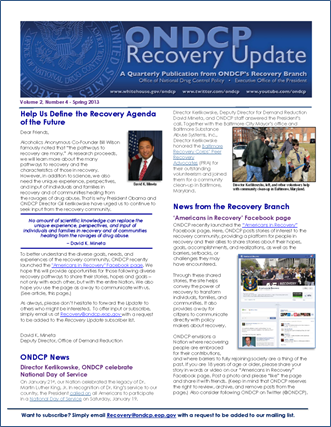 who has stood up, taken action, or otherwise supported recovery through their actions or work. The Spring 2013 issue can be found here. If you would like to receive the Quarterly Recovery Update by email, simply email a subscription request to us at [email protected].
who has stood up, taken action, or otherwise supported recovery through their actions or work. The Spring 2013 issue can be found here. If you would like to receive the Quarterly Recovery Update by email, simply email a subscription request to us at [email protected].
ONDCP has continued the tradition of soliciting and composing Recovery Month blogs. These are often moving stories of recovery that help dispel myths and misinformation and that demonstrate the power of recovery to transform not only individual lives, but families and communities as well. Here are last year’s entries:
This year again, ONDCP will be posting blogs for Recovery Month. In addition, we will be posting relevant stories on the Americans in Recovery Facebook page and linking the page and our blog posts. Blog entries will be posted here.
Please consider helping us get the word out by sharing what we are doing to highlight recovery.
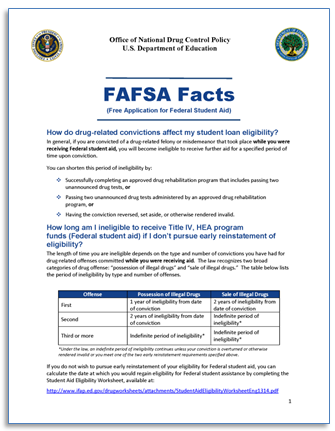 Eliminating barriers and expanding access to recovery support services are key recovery domain priorities delineated in the Strategy. On August 19, 2013 ONDCP and the Department of Education jointly released a document entitled FAFSA Facts (Free Application for Federal Student Aid). The purpose of the document is to eliminate confusion about the restrictions on Federal student aid eligibility associated with drug convictions and to outline the steps that can be taken to reinstate eligibility if one is affected by the law. Please forward it to organizations and individuals who may have interest in it.
Eliminating barriers and expanding access to recovery support services are key recovery domain priorities delineated in the Strategy. On August 19, 2013 ONDCP and the Department of Education jointly released a document entitled FAFSA Facts (Free Application for Federal Student Aid). The purpose of the document is to eliminate confusion about the restrictions on Federal student aid eligibility associated with drug convictions and to outline the steps that can be taken to reinstate eligibility if one is affected by the law. Please forward it to organizations and individuals who may have interest in it.
Additionally, in partnership with the Department of Housing and Urban Development ONDCP will be releasing profiles of promising Public Housing Authority programs providing housing and key services to individuals returning to the community from incarceration. Substance use disorders are extremely prevalent among these individuals and services related to them feature prominently in the programs that are being profiled. Moving forward, ONDCP will be focusing on barriers to employment for persons in recovery.
Finally, ONDCP fosters the expansion of recovery-oriented systems and services through a learning community involving 12 states and local governments, through SAMHSA grants, such as Access to Recovery, Targeted Capacity Expansion (TCE) Local ROSC, RCSP. Additionally, ONDCP participates in and sometimes convenes events highlighting the importance of systems and services that effectively support recovery.
The Strategy also contains action items in support of a “Smart on Crime” approach to drug enforcement, protecting communities from domestic and international drug-related crime while diverting non-violent drug offenders into treatment instead of prison. As part of this approach, the Strategy highlights promising criminal justice reforms, including drug courts and smart probation programs that reduce incarceration rates, along with community-based policing programs that 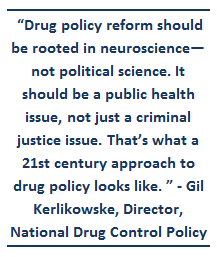 break the cycle of drug use, crime, and incarceration while focusing limited enforcement resources on more serious offenses. Additionally, recognizing that equal justice depends on individualized justice, Attorney General Holder refined its charging policies regarding mandatory minimums for certain nonviolent, low-level drug offenses.
break the cycle of drug use, crime, and incarceration while focusing limited enforcement resources on more serious offenses. Additionally, recognizing that equal justice depends on individualized justice, Attorney General Holder refined its charging policies regarding mandatory minimums for certain nonviolent, low-level drug offenses.
ONDCP relies heavily on input from experts, the recovery community, the general public, and others who care about our Nation’s substance use disorder problem and the steps that should be taken to address it. Please don’t hesitate to contact us about recovery policy through this address: [email protected]. Also, we welcome you to submit your input for the 2014 Strategy by emailing your comments directly to [email protected]. Please provide your feedback no later than September 30, 2013. Finally, consider liking the Americans in Recovery Facebook page, contributing to it, sharing it, and following us on Twitter (@ONDCP). Learn more about drug policy reform at www.whitehousedrugpolicy.gov/DrugPolicyReform.
It is only by informing, educating, and providing living testament to the power of recovery that we can begin to lift the stigma, shame, misunderstanding, and fear that shroud the truth about addiction and recovery, impeding our efforts to work together to build a healthier, safer, and more prosperous country.
Peter Gaumond
Chief, Recovery Branch
Office of National Drug Control Policy
|